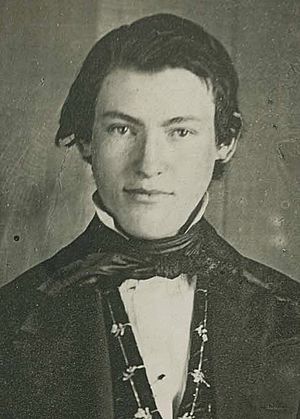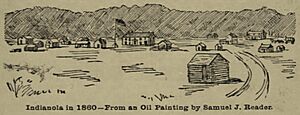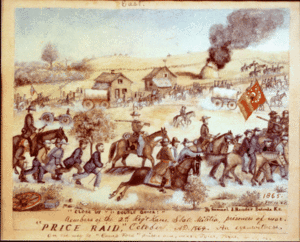Samuel J. Reader facts for kids
Quick facts for kids
Samuel J. Reader
|
|
|---|---|

Reader in 1855
|
|
| Born | Samuel James Reader January 25, 1836 Greenfield (present-day Coal Center), Pennsylvania, U.S. |
| Died | September 15, 1914 (aged 78) Topeka, Kansas, U.S. |
| Resting place | Rochester Cemetery, Topeka, Kansas, U.S. 39°06′16.0″N 95°40′48.9″W / 39.104444°N 95.680250°W |
| Occupation | |
| Years active | 1849–1914 |
| Spouse |
Elizabeth Smith
(m. 1867) |
| Children | 3 |
| Military career | |
| Allegiance | |
| Service/ |
Kansas State Militia |
| Years of service | 1863–1864 |
| Rank | |
| Unit | 2d Regiment |
| Battles/wars | American Civil War |
Samuel J. Reader (1836–1914) was an American diarist and artist. He wrote about his life in Bleeding Kansas and during the American Civil War.
Contents
Early Life and Moving to Kansas
Samuel James Reader was born on January 25, 1836. His birthplace was Greenfield, Pennsylvania. This area is now known as Coal Center, Pennsylvania. His father was Francis Reader, a carpenter. His mother, Catherine, died when Samuel was very young. He was then raised by his grandparents and his aunt.
From age five to 18, Samuel lived in La Harpe, Illinois. In 1847, he started writing in journals. He was inspired by the famous Lewis and Clark Expedition. He wanted to record his own life's events.
In 1855, Samuel traveled by wagon from Illinois. He settled on a farm near Indianola, in Shawnee County, Kansas. He lived there with his sister and aunt. He was an early settler of Shawnee County. His journals captured the history of the area as it became a state.
Art and Writing
Samuel Reader illustrated his writings. He used simple watercolor and oil paintings. He also made pen and ink drawings. His journals were written in both English and French. These artworks help us understand what life was like back then.
Role in Bleeding Kansas
Before the Civil War, Kansas had many conflicts. This time was called "Bleeding Kansas." People fought over whether Kansas would be a "free state" (no slavery) or a "slave state" (slavery allowed).
Samuel Reader was part of the Indianola Guards. This was a local group of soldiers. He also joined John Brown's forces. John Brown was an abolitionist, meaning he was against slavery. Samuel supported Kansas becoming a free state.
In 1856, Samuel fought against the Border Ruffians. These were pro-slavery groups from Missouri. He took part in the Battle of Hickory Point. This was his first time in a battle.
Service in the Civil War
During the American Civil War, Samuel Reader served in the Kansas state militia. He was a second lieutenant and later a paymaster. In October 1864, he fought in the Battle of Little Blue River. He was captured during this battle. However, he managed to escape three days later.
Samuel created an oil painting about this conflict. It is now at the Kansas Historical Society. His journal also describes several Civil War battles. One of his paintings, Before Dawn, is on the cover of a book about Kansas's role in the Civil War. He finished his military service on October 30, 1864.
Later Life
On December 18, 1867, Samuel married Elizabeth Smith. They were married in La Harpe, Illinois. They had three children, but only their daughter, Elizabeth, survived. His wife died in 1898 in Topeka, Kansas.
Samuel J. Reader passed away at his home on September 15, 1914. He was buried in Rochester Cemetery in Topeka. His journals and art give us a special look into a very important time in American history.
Images for kids
 | Tommie Smith |
 | Simone Manuel |
 | Shani Davis |
 | Simone Biles |
 | Alice Coachman |




